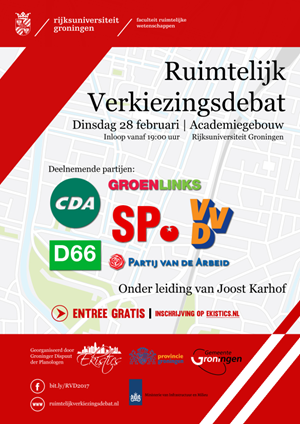Aspiring MPs debate spatial planning issues

The election debate on spatial planning took place for the third time on Tuesday 28 February, 2017. The debate was organized by the student's society 'Groninger Dispuut der Planologen Ekistics', with the support of the Faculty of Spatial Sciences. During the debate, which was held in the Academy Building, candidates representing the political parties CDA, D66, GroenLinks, SP, PvdA and VVD tackled issues concerning spatial planning.
The debate was opened by Joost Karhof, journalist and chairman of the evening’s proceedings. In his introduction Karhof noted that the debate would concern both regional and national issues of spatial planning. The floor was then given to Ward Rauws, lecturer in Urban and Regional Planning at UG. ‘For a spatial planner, this is really exciting,’ said Rauws as he stood before a 250-strong audience. Before the debate got underway, the voting keypads – which all attendees were given – were tested. This test showed that the majority of the audience consisted of students from the Faculty of Spatial Sciences. Students from other faculties, employees of the Province of Groningen and UG employees were also well-represented.
Quality of life
Rauws stressed the importance of addressing spatial issues, since the environment in which people live has a huge impact on their well-being and quality of life. This is precisely why we need to design that environment in a future-proof way, Rauws said. The spatial issues discussed during the debate were centred around renewable energy, the strength of the region, mobility and climate.
The role of the Dutch landscape
After the candidates introduced themselves, several statements were taken up for debate. One of these statements was: ‘The Dutch landscape has always been an energy landscape and should therefore, by definition, be used for energy production.’ The debate focused on national issues, but this statement elicited a great deal of comment on gas extraction in Groningen. Sandra Beckerman (SP) said that in Groningen it is ‘painfully clear how things should not be done’. Stientje van Veldhoven (D66) stated that, in the case of gas extraction in Groningen, the human aspect had simply been ignored. The majority of the candidates mentioned the importance of involving municipalities and residents early on in plans that affect the quality of life in a their neighbourhoods.
Mobility
Problems and opportunities in the province of Groningen also surfaced in the debate on mobility issues. The statement ‘Expansion of the road network should be accompanied by at least an equivalent investment in alternative mobility’ was introduced by a video in which a spokesman from Groningen Bereikbaar spoke about the way in which the southern ring road was being tackled. Considerable debate was sparked by the friction between two different approaches to traffic problems: laying more tarmac and increasing the volume of roadworks, versus encouraging alternatives to driving.
Shrinking versus growth areas
The abolition of property tax and investment by housing corporations in areas facing depopulation was also debated. Eelco Eikenaar, a member of the Executive Council of the Province of Groningen, introduced the theme. He emphasized that investing in areas facing depopulation is different from investing in growth areas, a distinction which Eikenaar believes is often fundamentally misunderstood in the House of Representatives. The debate closed with a plenary debate on a building freeze for developments at sea level.
Voting keypads
During the debate the audience used keypads to vote for the politicians they wanted to hear in a one-on-one debate about a particular statement. After the debate, attendees voted for the candidate they considered to be the winner. Both before and after the debate, the audience was asked to indicate which party they intended to vote for in the upcoming elections. Remarkably, GroenLinks had the most votes at the beginning of the debate, only to be overtaken by D66 by the end.
After a word of thanks from Ekistics member and co-organizer of the debate Paul Steeneken, a drinks reception was held at the Van Swinderen Huys.
Click here for the livestream of the Election Debate on Spatial Planning.More news
-
01 December 2025
The power of movement
